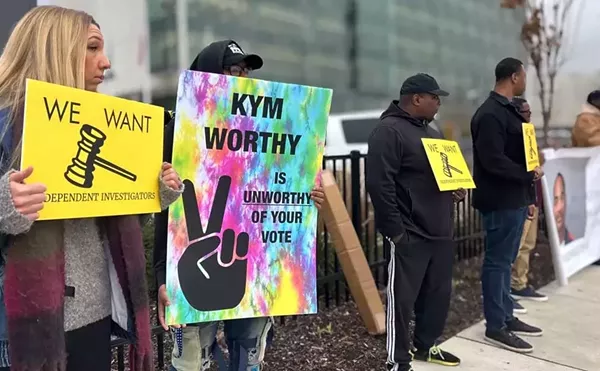Police transparency expands with new national database — except Michigan
Metro Times and the Invisible Institute sued Michigan State Police for officer records to track “wandering cops” who engage in misconduct


Audio By Carbonatix
[
{
"name": "GPT - Leaderboard - Inline - Content",
"component": "35519556",
"insertPoint": "5th",
"startingPoint": "3",
"requiredCountToDisplay": "3",
"maxInsertions": 100,
"adList": [
{
"adPreset": "LeaderboardInline"
}
]
}
]
A new online tool called the National Police Index launched this week, allowing residents in 17 states to access the employment history of police officers, with the aim of increasing transparency and accountability in law enforcement.
But for now, Michigan is not included in the database. That’s because the state police refused to disclose public records about the identities of current and former police officers.
In November 2023, Metro Times teamed up with the nonprofit news organization the Invisible Institute to file a lawsuit against Michigan State Police, alleging the agency violated the Freedom of Information Act.
The database — created by a coalition of journalists, attorneys, and data scientists, including the Invisible Institute, the Innocence Project New Orleans, and the Human Rights Data Analysis Group (HRDAG) — is designed to help track “wandering officers” who move from department to department after engaging in misconduct. The tool provides detailed information on why an officer left a position and allows users to download the data for further analysis.
“So-called ‘wandering officers’ have presented a significant danger to residents of every state, and an impediment to lasting police accountability,” said Chaclyn Hunt, legal director of the Invisible Institute, which is based on the South Side of Chicago and is known in part for the creation of the Civic Police Data Project, a repository of Chicago Police misconduct information dating back to 1988. “The National Police Index allows all stakeholders to view the employment history of officers in their city, town, village, or college.”
In Michigan, wandering cops have been a big problem. In October 2023, Metro Times revealed that the Detroit and Eastpointe police departments violated a 2017 law by failing to properly report officer misconduct, which enabled a disgraced former cop to get a new job. Ex-Detroit cop Kairy Roberts landed the new job in Eastpointe last year, despite an internal investigation that found he had punched an unarmed man in the face in Greektown, failed to provide medical aid, and then lied about the encounter in August 2021.
After Roberts resigned under pressure from the Detroit Police Department, the city did not report the alleged misconduct — as required — to the Michigan Commission on Law Enforcement Standards (MCOLES), the state agency responsible for regulating police. And Eastpointe falsely claimed to MCOLES that he had met the character fitness standards, which is required for officers to get their licenses reactivated. Those standards are intended to prevent abusive cops from getting another law enforcement job in the state.
Concerns about wandering cops are increasing as agencies face a shortage of officers. Without enough applicants, some police departments are lowering their standards for new officers and hiring cops with a history of misconduct, Metro Times revealed in a previous cover story investigation.
In March, MCOLES launched an investigation into the Warren and Romeo police departments after a Metro Times cover story showed that both departments appeared to violate the 2017 state law intended to stop wandering cops. At the time, Warren’s police commissioner William Dwyer told MCOLES that another officer, Robert Priest, retired in “good standing,” even though he was under investigation.
As a result, Priest was able to get another police job in Romeo, where he was fired after pulling over former Warren Deputy Police Commissioner Matt Nichols as part of a “special project” in February 2022. Nichols claimed Priest was out to get him because Nichols played a role in denying Priest a promotion to the rank of lieutenant.
The need for such a tool is also highlighted by cases like that of Sangamon County Deputy Sean Grayson, who was charged with the murder of Sonya Massey in Illinois. Grayson, who had been discharged from the U.S. Army for misconduct, worked in five police departments, with documented issues in at least two.
“If the Sangamon County sheriff knew people could easily monitor a police officer’s employment history, maybe Sean Grayson would have never been hired,” Hunt said.
The National Police Index currently includes employment data from 17 states, and efforts are ongoing to collect similar data in states, like Michigan, that have made it inaccessible.
In the FOIA request to Michigan State Police in January 2023, Metro Times and the Invisible Institute requested the names of all certified and uncertified officers in the state, along with information about their employment history.
On March 8, MSP declined to provide the identities of certified and uncertified officers, along with other information, arguing “the public disclosure of the information would constitute a clearly unwarranted invasion of an individual’s privacy.” State police also argued that releasing the names of officers “would endanger the life and safety of the law enforcement officers and their families, because the information would lead to [their] doxing,” referring to the act of publishing identifiable information about an individual on the internet.
But by withholding the identities of officers, MSP is impeding the public’s ability to track cops who lose their job in one place only to be rehired at another.
The University of Michigan Civil Rights Litigation Initiative filed the lawsuit on behalf of Metro Times and the Invisible Institute.
In an unusual move in April, Michigan Attorney General Dana Nessel sided with the news organizations’ lawsuit against the state police, filing a motion in support of releasing the public records in April.
As more information becomes available, additional states will be added to the index.
The Invisible Institute and its partners said they are committed to expanding the tool’s reach and continuing the fight for transparency in policing.
The launch of the National Police Index is considered a critical step toward improving police transparency nationwide, building on the success of the Civic Police Data Project, which has been used by journalists, activists, and wrongfully convicted people to expose misconduct and promote reform.
“The National Police Index works to make real the bedrock principle that records that relate to police transparency belong to the people,” said Craig Futterman, a former public defender and director of the University of Chicago Law School’s Civil Rights and Police Accountability Project. “The Civic Police Data Project in Chicago has powerfully contributed to this historic opportunity for police accountability. People wrongly in prison have used this information to win their freedom. Journalists and scholars have exposed systemic problems and created opportunities for policymakers to implement solutions. Community members have identified police officers engaged in patterns of abuse and held them to account.”
Futterman added, “The National Police Index holds the promise of enhancing police accountability throughout the country.”
The development of the National Police Index was supported by a broad coalition of organizations, including reporters, attorneys, and students, and is part of a wider effort to make police misconduct data accessible to the public. The partnership with Innocence Project New Orleans and HRDAG brings together experts in law enforcement accountability and human rights violations to track officers who move between agencies despite histories of misconduct.
Tarak Shah, a data scientist at HRDAG, pointed out the importance of this new tool for addressing impunity in law enforcement: “Police often avoid accountability by moving to another agency rather than face discipline. This tool, allowing anyone to look up and track the histories of such officers, provides an invaluable service for the human rights community in our fight against impunity.”
The National Police Index is seen as a powerful resource for law enforcement reform, addressing a longstanding gap in how officers with histories of misconduct are tracked.
“This tool will address a shortcoming in law enforcement hiring practices that has plagued our nation for years,” said Chris Burbank, former Salt Lake City Police Chief and current law enforcement consultant with the Center for Policing Equity. “Lacking prior accountability, officers who have been disciplined traverse the country seeking employment, and often, repeat the same poor practice or behavior. I applaud the work in this area and look forward to its success.”
The project was made possible by a coalition of journalists, legal professionals, and data organizations, including Big Local News at Stanford, CBS News, Hearst Newspapers, and others.
“This data is imperative for holding police officers accountable and tracking the movement of officers across jurisdictions, a common loophole exploited by those with histories of misconduct,” said Julie Ciccolini, the CEO and founder of Techtivist, a firm that works with defense attorneys and others to use data to track police misconduct. “By making officer information public, we close this gap, ensuring that there is public accountability and officers cannot escape scrutiny by simply changing uniforms.”
The Civil Rights Litigation Initiative (CRLI) at the University of Michigan Law School represents the Invisible Institute and the Detroit Metro Times in their lawsuit seeking the names of police officers in Michigan. The Michigan Court of Claims rejected the state’s attempt to dismiss the case and the parties are now in discovery. The court is likely to schedule an evidentiary hearing later this year.
“CRLI is excited to support the development of this national tool which will enable the press nation-wide to report on police misconduct and movement of officers between departments,” said Ellory Longdon, a student attorney with CRLI. “While we are disheartened that this tool does not yet include data on officers in Michigan, we are hopeful that the outcome of this lawsuit will enable greater transparency and accountability for law enforcement in Michigan.”









